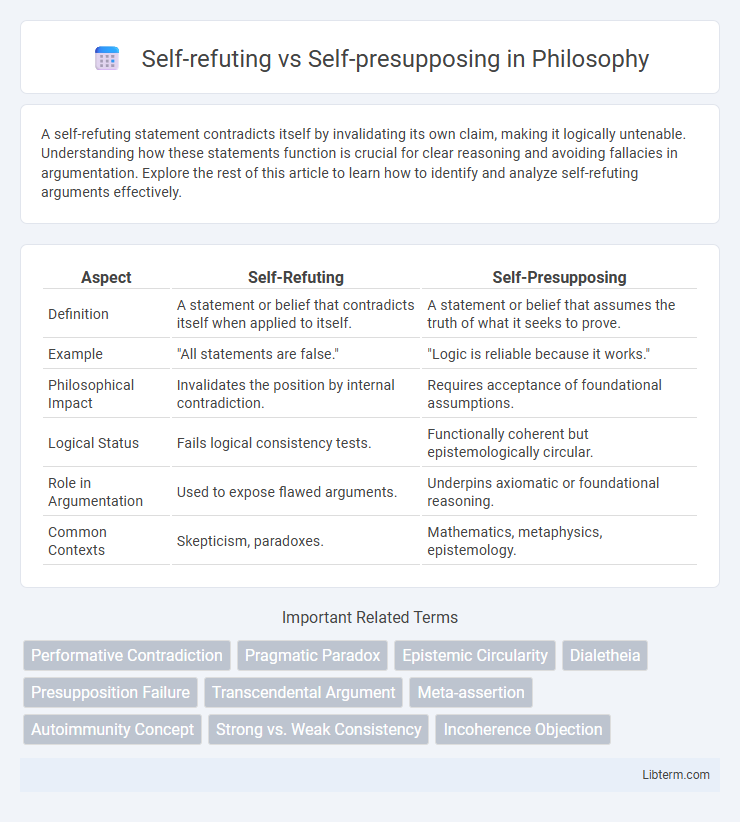A self-refuting statement contradicts itself by invalidating its own claim, making it logically untenable. Understanding how these statements function is crucial for clear reasoning and avoiding fallacies in argumentation. Explore the rest of this article to learn how to identify and analyze self-refuting arguments effectively.
Table of Comparison
| Aspect | Self-Refuting | Self-Presupposing |
|---|---|---|
| Definition | A statement or belief that contradicts itself when applied to itself. | A statement or belief that assumes the truth of what it seeks to prove. |
| Example | "All statements are false." | "Logic is reliable because it works." |
| Philosophical Impact | Invalidates the position by internal contradiction. | Requires acceptance of foundational assumptions. |
| Logical Status | Fails logical consistency tests. | Functionally coherent but epistemologically circular. |
| Role in Argumentation | Used to expose flawed arguments. | Underpins axiomatic or foundational reasoning. |
| Common Contexts | Skepticism, paradoxes. | Mathematics, metaphysics, epistemology. |
Understanding Self-Refuting Statements
Self-refuting statements contain inherent contradictions that invalidate their own claims, such as "I cannot speak a word of English" spoken in English. Understanding self-refuting statements involves recognizing how the assertion undermines its truth by the very act of expression or reasoning. Distinguishing these from self-presupposing statements, which assume the truth of what they claim, helps clarify logical coherence in argument analysis.
Defining Self-Presupposing Statements
Self-presupposing statements inherently require the truth of an implicit assumption for the statement to be meaningful or accurate, such as "The king of France is bald," presupposing that a king of France exists. These statements differ from self-refuting claims, which negate their own validity upon examination, like "I am lying now." Understanding self-presupposing sentences involves recognizing that their logical structure depends on the existence or truth of background conditions essential for their coherence.
Key Differences Between Self-Refuting and Self-Presupposing
Self-refuting statements inherently contradict themselves, making their truth logically impossible, as in the claim "all truth is relative" collapsing under its own premise. Self-presupposing statements, by contrast, rely on the acceptance of underlying assumptions for their validity, such as the presupposition that language and meaning exist in the claim "words have meaning." The key difference lies in self-refutation invalidating the claim outright, while self-presupposition necessitates shared foundational beliefs without immediate contradiction.
Philosophical Origins and Development
The distinction between self-refuting and self-presupposing concepts originates in classical philosophy, particularly in the works of Socrates and Aristotle, who explored the nature of contradictions and foundational assumptions in knowledge claims. Self-refuting propositions negate their own validity upon assertion, exemplified by the Liar Paradox, while self-presupposing statements rely on implicit premises that must be accepted for the statement to hold, as seen in the axioms of logic. This philosophical analysis has evolved through modern developments in epistemology and analytic philosophy, with figures like Ludwig Wittgenstein and Saul Kripke refining the understanding of how language and presuppositions shape truth conditions and argumentative coherence.
Classic Examples of Self-Refuting Claims
Classic examples of self-refuting claims include statements like "I cannot speak a word of English," which refute themselves by being expressed in English, or "There are no absolute truths," which contradicts itself by asserting an absolute statement. These claims inherently undermine their own validity through the act of their declaration, making them logically incoherent. The phenomenon contrasts with self-presupposing claims, which assume the truth of a premise for their meaningfulness without contradicting themselves.
Illustrative Cases of Self-Presupposing Assertions
Self-presupposing assertions rely on implicit assumptions that must be accepted for the statement to hold true, such as "The king of France is bald," presupposing the existence of a king of France. Illustrative cases include performative utterances like "I promise to come," which presuppose the speaker's ability to make promises, highlighting the dependency on underlying conditions. These examples contrast with self-refuting assertions, which contradict their own validity, whereas self-presupposing statements subtly depend on unchallenged background truths.
The Role of Language and Logic
Self-refuting statements inherently contradict their own validity through language, revealing logical failure by negating the conditions necessary for their truth. Self-presupposing propositions depend on implicit assumptions embedded in language that must be accepted for the statement to make sense or be meaningful. The interplay of language semantics and formal logic is crucial in distinguishing these concepts, as it determines whether a claim undermines itself or relies on foundational presuppositions for coherence.
Implications in Philosophical Debates
Self-refuting statements, such as "I cannot speak a word of English," undermine their own validity by contravening the conditions required for their assertion, thereby challenging the coherence of philosophical arguments. In contrast, self-presupposing statements assume the truth of certain premises without explicit proof, often shaping debate frameworks by embedding foundational beliefs that influence interpretations and conclusions. Recognizing the distinction between self-refuting and self-presupposing claims is crucial in evaluating the robustness of arguments and avoiding fallacious reasoning in philosophical discourse.
Common Misconceptions and Clarifications
Self-refuting statements assert their own falsehood, exemplified by "This statement is false," leading to contradiction and invalidity. Self-presupposing statements assume the truth of their premise, such as "The universe exists," which cannot be disproven within the statement itself. A common misconception is conflating these concepts, but clarification reveals self-refutation undermines its own claim, while self-presupposition depends on an unchallenged premise rather than logical contradiction.
Practical Applications in Critical Thinking
Self-refuting statements, such as "I cannot speak a word of English," invalidate themselves through contradiction, highlighting the importance of identifying logical inconsistencies in argument evaluation. Self-presupposing statements, like the acknowledgment of one's own existence in "I think, therefore I am," rely on their truth to hold meaning and are crucial for establishing foundational beliefs in critical thinking processes. Recognizing these distinctions enhances practical critical thinking by improving argument analysis, fostering deeper understanding, and preventing fallacious reasoning in decision-making contexts.
Self-refuting Infographic

 libterm.com
libterm.com